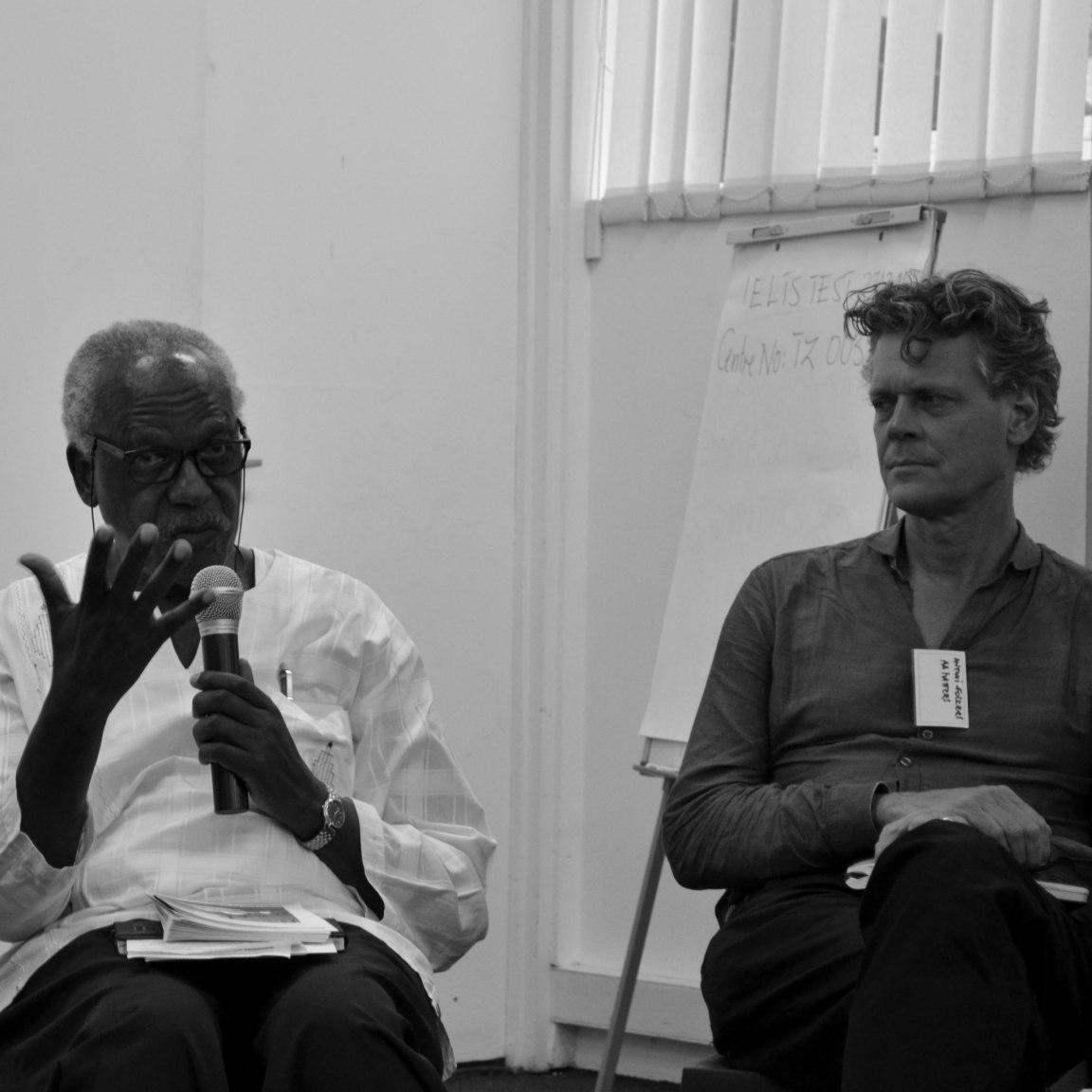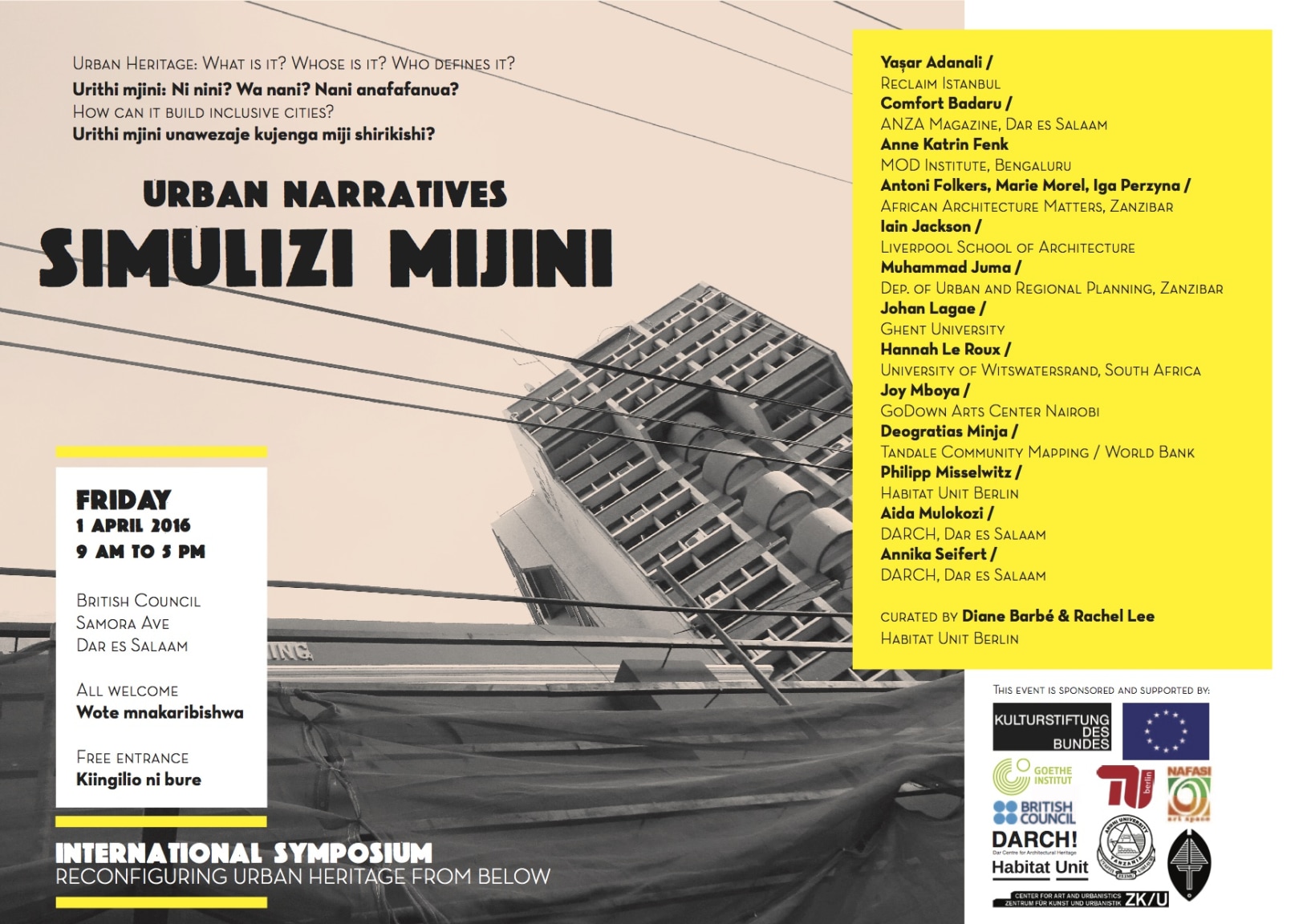
events
BERLIN – DAR ES SALAAM
Urban heritage: what is it? Whose is it? Who defines it?
Urithi m’jini: Ni nini? Wa nani? Nani anafafanua?
• How to open the discussion to new voices without leading the debate?
• How to make room for other agencies in deciding about preservation and planning?
• Where can we see and appreciate uncanny history in Berlin and Dar es Salaam?
• Where do residents root their memories, and what do these spaces look like?
upcoming
• Call for abstracts (deadline: December 18th)
call for abstracts (PDF)
• International conference at TU Berlin (Berlin / 16-17 March 2017)
• Final exhibition at ZK/U (Berlin / opening 16 March 2017)
• Contribution to DARCH‘s collections on oral history (Dar es Salaam / TBA)
previous
• Jahresende Institut für Architektur Exhibition (TU Berlin / July 2016)
• Decolonizing the Academy (University of Edinburgh / April 2016)
• International symposium (Dar es Salaam / April 2016)
International symposium in Dar
Yaşar Adnan Adanalı
Yaşar Adnan Adanalı worked on development planning, research and management in London, South America and Tanzania. Yasar coordinated the Istanbul Forced Eviction Map, which was first exhibited at the International Architectural Biennale Rotterdam and at the Open City Istanbul Exhibition. Yaşar is co-founder of the independent urban research institute Beyond Istanbul. He is a voluntary member of One Hope Association (Istanbul) and keeps blogs such as Reclaim Istanbul and Mutlukent (Happy City).
Comfort Badaru
Comfort Badaru is a graduate from Ardhi university’s architecture degree. She is a co-founder and editor of ANZA magazine in Dar es Salaam, the first architecture magazine for East Africa, which has gained wide exposure in Europe and East Africa. She has been selected to pursue a masters’ degree in Urban Management at the Technische Universität in Berlin in 2016-2018.
Walter Bgoya
Walter Bgoya is the managing editor of Mkuki na Nyota, an independent scholarly publishing company in Dar es Salaam, and chairman of the international African Books Collective. From 1972 to 1990 he directed the Tanzania Publishing House, which played a major role in making Dar es Salaam a center for progressive intellectuals from around the world.
Antoni Folkers, Iga Perzyna & Marie Morel
Antoni Folkers, Iga Perzyna and Marie Morel are part of the team of African Architecture Matters, a not-for-profit organization founded in 2010 by Antoni Folkers and Berend van Der Lans. Together, they have worked on the Ng’ambo Tuitakayo project, exploring issues of urban regeneration and using intangible heritage practices as a tool for urban planning in Ng’ambo, the lesser known part of Zanzibar Town.
Iain Jackson
Iain Jackson is a Senior Lecturer, BA Director of Studies and architect at the Liverpool School of Architecture. Focusing on the history of architecture in postcolonial nations, he directed a research program on the notion of modernism within India, specifically in Chandigarh. As part of Envisioning the Indian City: Spaces of Encounters, an augmented reality app was created for the city of Kolkotta which intends to to re-imagine the city and its population and open a platform for discussion on urban heritage.
Muhammad Juma
Muhammad Juma is an architect and urban planner from Zanzibar. He has worked as a consultant for the UNESCO World Heritage Centre in Paris in the field of conservation in Africa and contributed to developing the Historic Urban Landscape recommendations for sustainable management of urban heritage. He is currently the Director of Urban and Rural Planning in the Zanzibar Islands (DoURP) and is engaged in the preparation of a new land reform and Spatial Framework for the Zanzibar Islands.
Johan Lagae
Johan Lagae is a Professor at Gent University and currently teaches 20th century architectural history with a focus on the non-European context. He has conducted research on urban and architectural heritage in Kinshasa, DR Congo, and has led the European Architecture beyond Europe between 2010 and 2014, which allowed the creation of an international community of scholars from more than 15 European countries and partner countries, such as Australia, Argentina, Algeria and Israel.
Hannah Le Roux
Hannah Le Roux teaches, practices, curates and writes about architecture at the University of Witwatersrand, Johannesburg. Her current research, lived modernism, is based on the observation of change in time of modernist spaces, and proposes and maps designerly practices that catalyze the social appropriation of space.
Joy Mboya
Joy Mboya is the Executive Director of the GoDown Arts Center, a leading non-profit multidisciplinary arts facility in Nairobi, Kenya, that provides subsidised space for Kenyan artists and spearheads entrepreneurial capacity building programs and creative sector discourses for artists in the East Africa region.
Deogratias Evarist Minja
Deogratias Minja is a consultant for the World Bank and collaborated with Kenya-based NGO Groundtruth to document the resources and features of Tandale, a partly informal neighborhood of Dar es Salaam, via open street map. A community-based blog and mapping programme which can be visited here.
Philipp Misselwitz
Philipp Misselwitz is an architect and urban planner based in Berlin. He received his PhD from Stuttgart University for research on socio-spatial development within urbanised refugee camps. He is currently the Chair of Habitat Unit at the Institute for Architecture of the Technische Universität Berlin – a globally networked research and teaching centre focused on the study of urbanisation processes in the Global South. His current research focuses on user-driven urban development processes and co-production in housing in the Global South, rural urbanisation processes, translocal spatial production as well as transdisciplinary teaching methodologies in the urban design field.
Annika Seifert
Annika Seifert is initiator and coordinator of the newly founded heritage management and architectural preservation think tank DARCH!, made possible by a grant by the European Development Fund. Since 2010, she has worked for the Goethe-Institut Tanzania, developing and coordinating the project series Global City – Local Identity, which looks at rapid urban development and the phenomenon of a cultural identity crisis in east Africa. Her current research in the field of urban heritage and city development in East Africa and the global south is also the subject of her PhD thesis.
SIMULIZI MIJINI INTERNATIONAL SYMPOSIUM
RECONFIGURING URBAN HERITAGE FROM BELOW
APRIL 1st, 2016
9 am – 5 pm at The British Council, Samora Avenue – Dar Es Salaam, Tanzania (map)
Urban Heritage: What is it? Whose is it? Who defines it?
Urithi m’jini: Ni nini? Wa nani? Nani anafafanua?
How can it build inclusive cities?
Urithi m’jini unawezaje kujenga miji shirikishi?
The Dar Centre for Architectural Heritage (DARCH) in collaboration with the Technical University Berlin and the Architects Association of Tanzania have the pleasure of inviting you to participate in the International Symposium Simulizi Mijini / Urban Narratives. We will present international examples of inclusive heritage practices and discuss their relevance for the context of Dar es Salaam.
Curated by Diane Barbé & Rachel Lee
We will be delighted to welcome you to the event! Free Admission. RSVP to darch . tz @ gmail . com (no spaces)
The event is part of the Habitat Unit research projects Simulizi Mijini / Urban Narratives and DARCH! Dar es Salaam Centre for Architectural Heritage. For information about the ongoing research process please visit this page.

